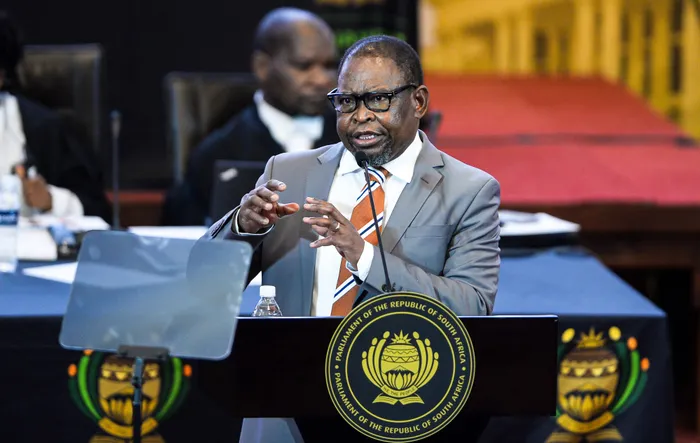Godongwana: Just transition to low carbon economy key to end blackouts

Minister of Finance Enoch Godongwana at the City Hall delivered the 2023 Budget Speech. Picture: PHANDO JIKELO/African News Agency (ANA)
AS the country hovers on the brink of up to 12 hours without electricity, Minister of Finance Enoch Godongwana lamented the implementation of a just transition to low carbon economy as a solution to the power crisis.
This week Eskom implemented stage 6 load shedding after more than half (24 809 MW) of the utility’s capacity of 48 000 MW went out of service due to breakdowns and units that were out on maintenance.
Godongwana in his Budget speech earlier this week touted the country’s just energy problem and the national energy crisis committee’s plans to increase the energy generation capacity.
The government, according to Godongwana, is also taking urgent measures to reduce load shedding in the short term and transform the sector through market reforms to achieve long-term energy security.
“In the short term, the national energy crisis committee aims to improve the availability of electricity and facilitate investment in generation capacity.”
If planned investments are implemented rapidly, 6 484 MW could be added to the grid over the next 24 months, he said.
Godongwana said the implementation of the just transition program would address climate change that continued to pose a risk to the country.
“Climate change poses considerable risks and constraints to sustainable economic growth in South Africa, we are among the most water-scarce countries in the world, and recent events have shown that extreme weather events such as floods, heat waves and drought, are occurring more often," he said.
“Our Just Energy Transition Plan (JETP) addresses these urgent climate challenges. It aims to significantly lower emissions of greenhouse gases and harnesses investments in new energy technologies, electric vehicles, and energy-efficient appliances," he said.
Godongwana said the plan ensures that communities tied to high-emitting energy industries were not left behind, and were provided with new skills and new economic and employment opportunities.
“Through the Just Energy Transition Investment Plan, launched by the president in 2022 at the COP27, the country will make significant investments in our economy over the next five years, supported by a coherent industrial policy to enable innovation and economic diversification,” said Godongwana.
The International Partners Group of developed economies in 2021 pledged US$8.5 billion to support South Africa’s transition.
“This will go a long way,” he said.
“South Africa, through its role in the G20, the IMF and the World Bank, has stressed that developed nations could do more to support the energy transitions of developing nations, especially by ensuring that the financial support includes a much larger grant-funding component.”
Energy economist Lungile Mashele said she supports the plan as long as it benefits all including the poor.
“There’s no denying the impact climate change has had on the globe especially on small islands and Africa,” Mashele told the Weekend Argus.
“However, it is not fair to expect poor nations to carry the burden of transitioning for rich countries.
“South Africa must and will transition but at a scale and pace that it can afford and does not leave it with energy insecurity or energy poverty.”
DA MP and climate change activist Traverse le Goff said there is a real opportunity for South Africa to substantially reduce the impact of the national energy crisis by embracing the green economy while ensuring a just energy transition.
“The answer to ending load shedding is actually really quite simple: completely open up the IRP process so the private energy market is not artificially suppressed by all these bid windows, and then we must build as much wind, solar PV and dispatchable battery energy storage as quickly as we can,” he said.
“Eskom must focus on upgrading its distribution and transmission equipment to match the new generation capacity so the entire energy system can operate efficiently,” said Le Goff.
“We can’t really expect much more from Eskom at this stage. The just energy transition is about protecting South Africans employed in the coal and fossil fuel value chains, and the real opportunity here is to ensure that every single one of those workers are all retooled and trained and absorbed into the new green energy economy, nobody has to lose their jobs or see renewables as the enemy.”
Le Goff added that the nation could actually have a massive jobs boom if it did this rapidly and embraced the green re-industrialisation of the economy.
Godongwana also announced new tax incentives for individuals and households, an encouraging development as households can contribute substantially to the ending of the energy crisis.
The tax incentives for the coming fiscal year is standing at a rate of 25% for individuals.
This will bring about tax relief totalling R13bn to support the clean-energy transition, increases electricity supply and limits the impact of consistently high fuel prices.
Weekend Argus
Related Topics: